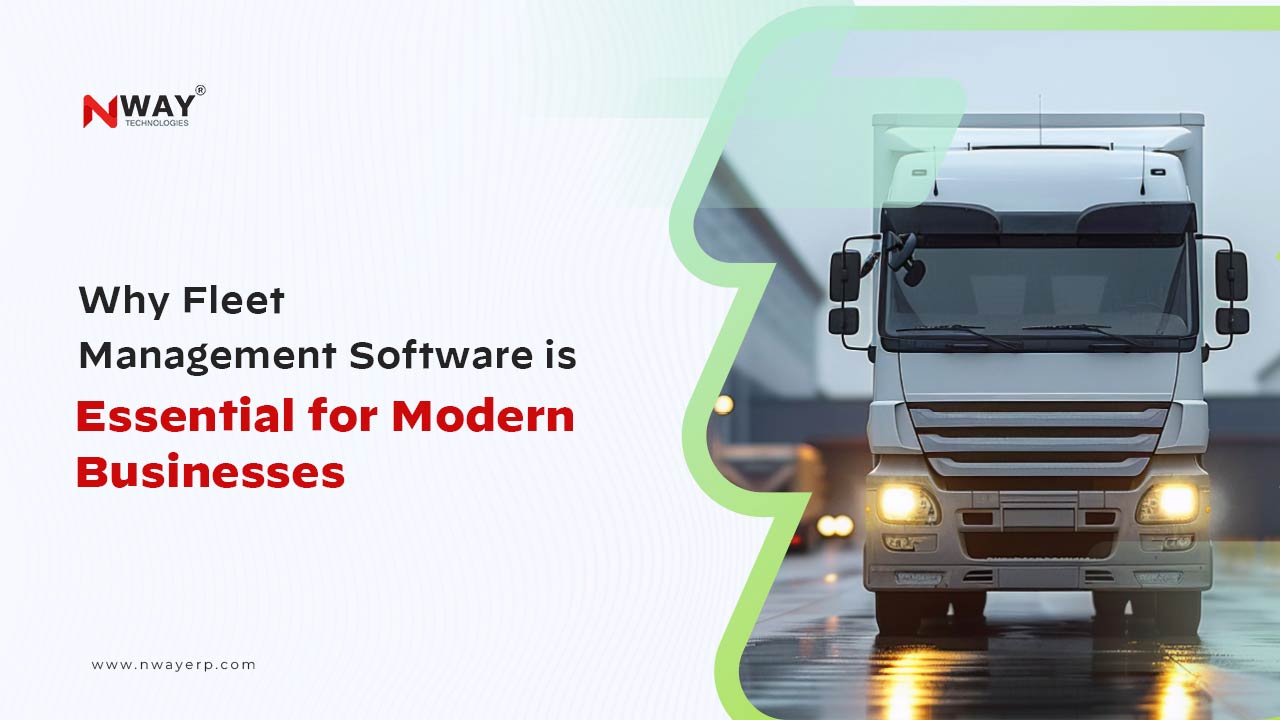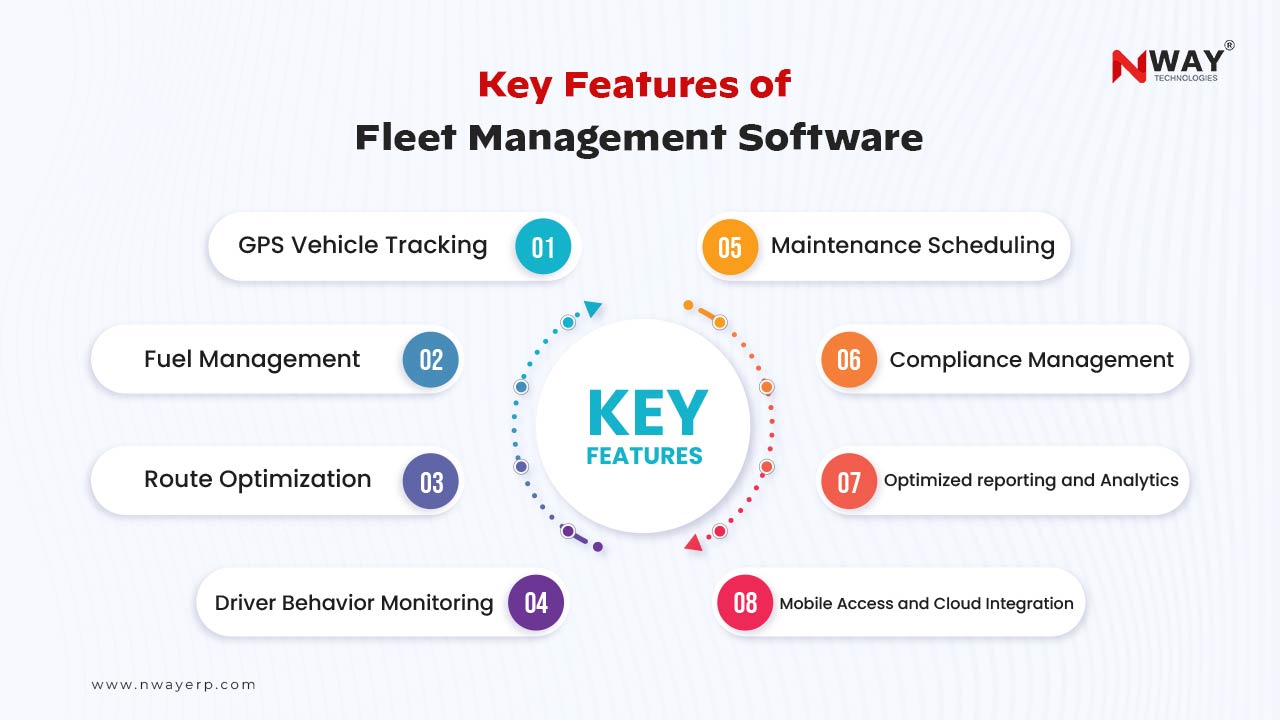Why Fleet Management Software is Essential for Modern Businesses

Any business around the world relies on transportation and logistics. These businesses remain competitive around the corner to optimize their multiple operations. Managing a fleet of vehicles efficiently is a significant challenge that involves tracking vehicles, monitoring fuel usage, ensuring timely maintenance, and complying with regulations. A fleet management software (FMS) comes into play. It helps businesses streamline fleet operations, reduce costs, and improve efficiency. Whether managing a small delivery fleet or a large logistics operation, investing in the right software is essential for success.
In the blog, explore what fleet management software is and why it is essential for modern transport businesses.
What is Fleet Management Software?
Fleet management software is a digital solution designed to help businesses manage their fleet of vehicles efficiently. It integrates various features, such as GPS tracking, fuel management, route optimization, driver behavior monitoring, and predictive maintenance and analytics. With real-time insights and optimization, a fleet management system allows fleet managers to make data-driven decisions that enhance productivity and safety while minimizing costs.
Benefits of Fleet Management Software
Enhanced Operational Efficiency
Fleet management software helps businesses run their day-to-day operations such as vehicle maintenance, tracking, fuel consumption, and more. By digitizing these processes, companies can reduce manual errors and increase productivity. Real-time GPS tracking leads to faster deliveries and improved customer satisfaction.
Cost Reduction and Fuel Optimization
One of the biggest challenges for businesses is to manage fuel consumption for fleets. Fleet management solutions provide insights into fuel usage, driver behavior, and route efficiency, helping companies identify areas to cut costs. By monitoring fuel consumption and reducing unnecessary idling, businesses can manage lower fuel consumption expenses and carbon emissions.
Predictive Maintenance and Reduced Downtime
Unexpected vehicle breakdowns can restrict business growth due to sudden disruptions in operations, leading to costly repairs. A fleet management software can schedule preventive maintenance by analyzing vehicle performance data and sharing service reminders for check-ups. This proactive maintenance approach helps in extending the lifespan of vehicles, preventing expensive repairs, and effectively reducing downtime.
Improved Compliance and Safety
Regulatory compliance is a critical component of fleet management. Fleet management software helps ensure that businesses adhere to industry standards by tracking vehicle inspections, driver logs, and licensing requirements. It also improves safety by monitoring driver behavior like speeding, harsh braking, and unauthorized vehicle usage. By addressing driver behavior, businesses can prevent accidents, protect assets, and lower insurance premiums.
Real-time Data and Analytics for Better Decision-Making
Data-driven decision-making is vital for business growth. Fleet management software provides real-time analytics on vehicle utilization, driver performance, fuel efficiency, and operational costs. With detailed reports and insights, fleet managers can make informed decisions to optimize operations and boost overall efficiency.
Enhanced Customer Satisfaction
Timely deliveries and efficient service are key factors in maintaining customer loyalty and satisfaction. With fleet management software, businesses can provide accurate delivery time estimates, real-time tracking for customers, and quick response to service requests. This level of transparency helps build trust and enhances the overall customer experience.
Scalability & Adaptability
As businesses grow, fleet management needs to evolve. A robust fleet management system allows companies to scale their operations by integrating new vehicles, routes, and drivers effectively. The adaptability of a good solution helps in ensuring businesses remain efficient and competitive in a rapidly changing marketplace.
Key Features of Fleet Management Software

01. GPS Vehicle Tracking
This feature evokes real-time tracking of vehicles, it also allows fleet managers to monitor location, speed, and movement patterns. It also helps in route optimization and theft prevention.
02. Fuel Management
Fuel management features help track fuel consumption, manage anomalies, and manage fuel wastage through better driving practices and route planning.
03. Route Optimization
The fleet management system provides data analytics to determine the most efficient routes, reducing travel time, fuel costs, and vehicle wear and tear.
04. Driver Behavior Monitoring
Advanced telematics allows businesses to track driver behavior, such as speeding, harsh braking, and idling, helping improve safety and compliance.
05. Maintenance Scheduling
Automated reminders for routine maintenance and predictive analytics help reduce vehicle downtime and unexpected repair costs.
06. Compliance Management
Fleet management software helps ensure compliance with local and industry regulations by tracking driver logs, vehicle inspections, and emissions data.
07. Optimized reporting and Analytics
The software helps in generating reports on vehicle performance, expenses, and operational efficiency, assisting in streamlining decision-making.
08. Mobile Access and Cloud Integration
With mobile and cloud-based capabilities, fleet managers can track, analyze, monitor, and manage operations remotely, ensuring seamless communication and control.
Conclusion
Fleet management software is no longer a luxury but a necessity for modern businesses that rely on transportation and logistics. From reducing operational costs to enhancing efficiency, safety, and productivity. The key features, such as GPS tracking, fuel management, and predictive maintenance, make it an invaluable asset for any company. Investing in robust fleet management software helps businesses’ fleet managers stay proactive, remain competitive, and achieve long-term profitability.
So as a fleet manager are you looking to optimize your fleet? If so, now is the time to utilize the power of fleet management software and take advantage of your services to the next level. Contact us now and discuss this with our team of experts.